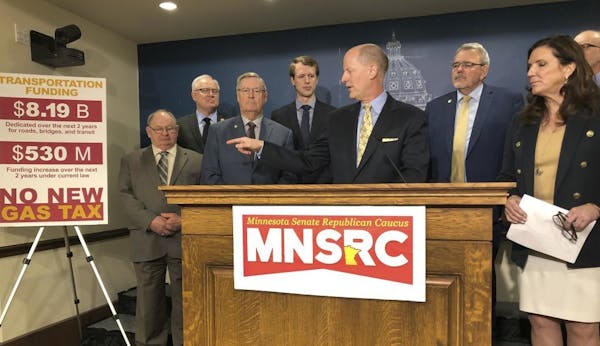The Minnesota House and Senate moved in opposite directions Tuesday on Gov. Tim Walz's proposed increase in the gas tax of 20 cents per gallon.
The Democratic-controlled House released a massive $7.28 billion, two-year transportation bill that would significantly increase spending on roads, bridges and transit across Minnesota. The new spending would be funded by a gas tax increase, which would be phased in over four years and then increase with inflation. The plan also calls for an increase in the metro sales tax and higher fees.
The Republican-controlled Senate transportation committee, meanwhile, rejected the gasoline tax hike as well as other tax increases first proposed by the new Democratic governor in February.
"This is the most regressive tax on the poorest of the poor," said state Sen. Jeff Howe, R-Rockville.
Under the proposal from Walz and House Democrats, the state gas tax would increase from its current 28.5 cents per gallon to 48.5 cents, with an estimated 1.3-cent-per-gallon increase after that, based on inflation. Other driving-related fees would go up, while sales taxes would increase for metro residents to pay for better transit.
"We're not keeping up," said Rep. Frank Hornstein, D-Minneapolis, chairman of the House Transportation Committee. "This is a 50-year old infrastructure. So unless we see a major investment, we're going to continue to see what we saw on I-94: a pavement failure," he said, referring to a recent incident in which 14 motorists were struck with flat tires on a section of the interstate between the Portland Tunnel and Hiawatha Avenue.
Democrats and their allies — including the building trades lobby — point to an estimated 720,000 new residents in the metro region in the next 20 years, as well as an expected increase in freight loads that will further damage roads and cause traffic delays.
They also prefer gas tax revenue that is dedicated solely to transportation, leaving other funds for top priorities like schools and health care.
Republicans in the Legislature dedicated some sales tax revenue to transportation in 2017. Some have sought to supplement road dollars by transferring money from other programs.
The vast chasm between the two parties on transportation is being seen as a preview of the difficult budget negotiations to come at the end of the session in May. The two parties and the two chambers — the only divided Legislature in the nation — have to strike a compromise and craft a two-year overall state budget that will approach $50 billion.
J. Patrick Coolican • 651-925-5042

Fact check: Walz and Vance made questionable claims during only VP debate

In Tim Walz's home city, opposing groups watch him debate on the national stage

